 about prayer
about prayer
and about being alone with God
for the love of Christ and of the whole Church
there are few paths more magnificent
than that of the Carthusians:
monasteries of men and monasteries of women
tucked away in different corners of the world,
from France to Vermont,
from Brasil to Korea.
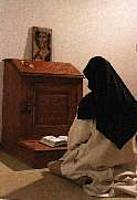 The Carthusians live lives of intense simplicity and even more intense prayer.
The Carthusians live lives of intense simplicity and even more intense prayer.
"Who is called to a life such as this? The vocation so centers in God and is directed by Him and for Him that the choice cannot possibly come from man. The hermit cannot progress along this often perplexing path unless God wishes it and calls the person to it, and gives him the graces for it....
"A candidate needs fairly good, though not exceptional, physical health to sustain the rigors of the vocation. In particular, given the more intense stresses of solitude, a candidate must be free of any serious emotional and psychological pathology; indeed even lesser degrees of trauma can prove an obstacle. The common practice is, therefore, to have candidates take psychological testing before admittance into the community.
 "The Carthusian life requires significant human maturity and sound judgment. The Statutes allow no one under 20 to be admitted, and in fact, given the delayed maturity in the West today, a person does not enter before he is 23. Since adaptability to such a life becomes increasingly difficult after mid-life, the upper age limit is 45, though candidates over 40 are not
"The Carthusian life requires significant human maturity and sound judgment. The Statutes allow no one under 20 to be admitted, and in fact, given the delayed maturity in the West today, a person does not enter before he is 23. Since adaptability to such a life becomes increasingly difficult after mid-life, the upper age limit is 45, though candidates over 40 are not  often considered."A reposed, open and sociable character is very desirable. In addition, cloister candidates are asked to have some knowledge of Latin and a liberal arts background if at all possible, with at least two years of college. The brothers are encouraged to have a high school education or the equivalent.
often considered."A reposed, open and sociable character is very desirable. In addition, cloister candidates are asked to have some knowledge of Latin and a liberal arts background if at all possible, with at least two years of college. The brothers are encouraged to have a high school education or the equivalent.
"Once the applicant has contacted the community, the Charterhouse sends a questionnaire concerning personal information and references. If the Superiors discover there is sufficient possibility of a vocation, they invite him to make a retreat of at least a month’s duration (if possible) at the monastery. During his retreat, he is gradually introduced to the Carthusian life and encouraged to participate as fully as his capacity permits. If at its end, the applicant remains convinced of his calling and wishes to take the next step, and if the Superiors, with the assistance of the grace of God, validate his discernment, then together they decide when he should enter the novitiate. Once admitted, the candidate becomes an aspirant for a period of about six months.... During this period, it is discerned whether he should proceed to the state of novice where he becomes a member of the community.... He remains in this state for two years. If he remains firm in the conviction of his calling, the candidate may be allowed to take the vows of stability, obedience and conversion of life (in which are implicitly included chastity and poverty) for three years..... At the end of this first term, he renews his vows for two additional years. After this second term, he leaves the novitiate and the supervision of the Novice Master to live among the solemn professed and perpetual donates where he slowly forms himself to the maturity of a solitary.

If assurances appear that he is called to and capable of the Carthusian life, the monk makes his final and solemn profession."
(text from the Charterhouse of the Transifguration, Vermont USA)Please see the Carthusians' excellent site for more information and for the locations of the Charterhouses throughout the world:
http://www.chartreux.org/ 
Happy National Vocation Awareness Week!(adapted from a post on A Penitent Blogger)
 "Do I desire to belong to Christ alone and live my whole life
"Do I desire to belong to Christ alone and live my whole life



 "Sometimes it takes place
"Sometimes it takes place 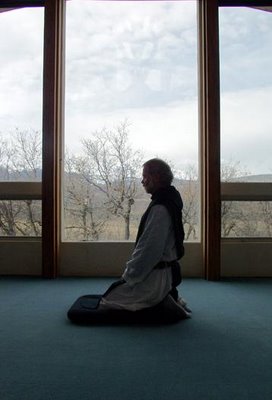

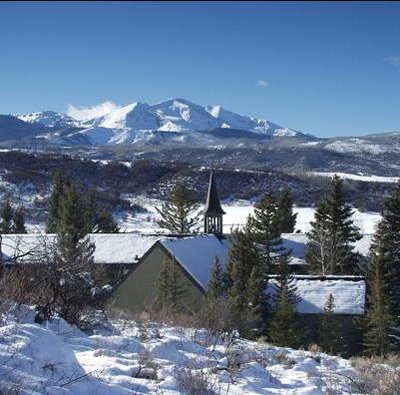

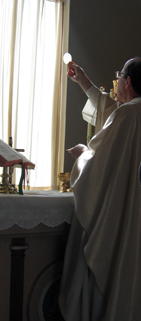

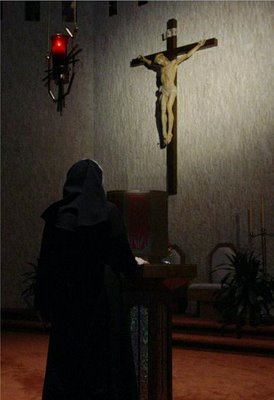
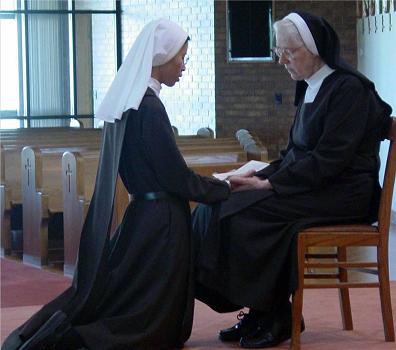


 "Single women (ages of 18-40) speak with our Prioress, Mother Mary Anne, and then come to visit the community. These first visits provide a glimpse of what our life is like and offer both sides to get to know one another. At each stage of the process, both the community and the individual discern whether or not God is calling the woman to our monastic community."
"Single women (ages of 18-40) speak with our Prioress, Mother Mary Anne, and then come to visit the community. These first visits provide a glimpse of what our life is like and offer both sides to get to know one another. At each stage of the process, both the community and the individual discern whether or not God is calling the woman to our monastic community."







